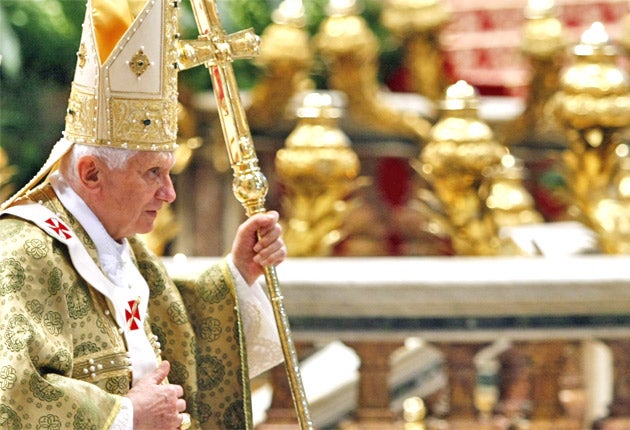Tax investigation could land Pope with €8bn bill
European Commission to investigate exemption allowing the Vatican to avoid paying £2bn a year levy on 100,000 properties

Your support helps us to tell the story
From reproductive rights to climate change to Big Tech, The Independent is on the ground when the story is developing. Whether it's investigating the financials of Elon Musk's pro-Trump PAC or producing our latest documentary, 'The A Word', which shines a light on the American women fighting for reproductive rights, we know how important it is to parse out the facts from the messaging.
At such a critical moment in US history, we need reporters on the ground. Your donation allows us to keep sending journalists to speak to both sides of the story.
The Independent is trusted by Americans across the entire political spectrum. And unlike many other quality news outlets, we choose not to lock Americans out of our reporting and analysis with paywalls. We believe quality journalism should be available to everyone, paid for by those who can afford it.
Your support makes all the difference.Eight billion euros worth of tax breaks pocketed by the Catholic Church in Italy could be in breach of European law and may have to be repaid, it has emerged.
The development is the latest blow to an institution that has been rocked by an annus horribilis following the global clerical paedophilia scandal that broke earlier this year, and investigations into money laundering.
The European Commission has said that tax relief on 100,000 Italian properties enjoyed by the Holy See since 2005 was under the spotlight, after announcing an "in-depth" investigation.
A spokesperson for Competition Commissioner Joaquin Almunia said the EC suspected the exemption amounted to state aid that was at odds with European Union law.
"These exemptions may distort competition," he said. "Thus far, Italian authorities have not provided sufficient evidence to enable the Commission to conclude that the contested measures are justified by the principles of the Italian tax system".
The crux is whether the EC decides Church-run businesses should really be considered as commercial enterprises and therefore liable to taxation.
The Church was exempted from paying the tax, known as ICI in 2005 by a centre-right government under the then Prime Minister Silvio Berlusconi. The conservative premier is now back in power after re-election in 2008.
When the 2005 rules were introduced, humanist and secularist organisations claimed it was "unfair help" and breached the principle of division between church and state.
The EU initially questioned the ICI exemption in 2005, which resulted in the measure being modified a year later by the then centre-left government of Romano Prodi. The EC twice shelved the case, first in 2008 and again this year. News agency Ansa reported that its decision to reopen the case now was made after the Radical Party filed a complaint with the European Court of Justice.
If Italy is found to have violated EU subsidy laws, it will have to cancel the exemption and seek reimbursement from the church. If that happened, the financial consequences for the Catholic Church would be grave.
Estimates value the Vatican's property tax breaks at €2bn (£1.75bn) a year. No one from the Vatican was available to comment on the EC probe. However, a statement by the Italian foreign ministry said: "The Italian government is convinced that it can demonstrate to the EC in a clear and definitive manner the good reasons that justify the current regulations, which do not violate EU rules on state help in favour of the church."
The church currently avoids paying tax on about 100,000 non-commercial properties including 8,779 schools, 26,300 ecclesiastical structures and 4,714 hospitals and clinics.
In addition to avoiding ICI, the church also benefits by paying only 50 per cent of the IRES business tax on its commercial earnings, thanks to Italian tax laws adopted in the 1950s which granted deductions for charitable organisations.
Italian and EU authorities were already poring over the Vatican's opaque finances. Last month it emerged that Vatican Bank president Ettore Gotti Tedeschi and director-general Paolo Cipriani are being investigated following two transactions that were reported as "suspicious". The announcement by magistrates was seen as the judiciary's way of pressuring the Vatican into being more open about its financial operations. Both men strongly deny the allegations.
More serious investigations are thought to relate to suspicions by magistrates Nello Rossi and Stefano Rocco Fava that other Vatican Bank officials used the institution, known as IOR, and its status as a non-Italian entity, to avoid taxes as well as to launder money.
News of the EC probe on tax breaks will also send a shudder through Vatican financiers, who already fear the effect the paedophilia scandal will have on voluntary donations – the financial life-blood of the church, not to mention the raft of litigation they may face from abuse victims in the coming years.
In Italy, taxpayers can opt to earmark 0.8 per cent of income tax payments to the religions of their choice – in most cases the Catholic Church, which last year benefited to the tune of €900m. The proportion of taxpayers donating this money to the church peaked at 90 per cent in 2004. It fell slightly to 87 per cent in 2008, however, and church authorities fear further slides on the back of this year's dreadful headlines.
The EC has previously investigated how other member states tax former state religions, including probes into subsidies for the Catholic church in Spain and sales tax rules for churches in Belgium. The EC also plans to examine rules giving tax breaks to church institutions and amateur sports clubs by ensuring they maintain non-commercial status.
Join our commenting forum
Join thought-provoking conversations, follow other Independent readers and see their replies
Comments